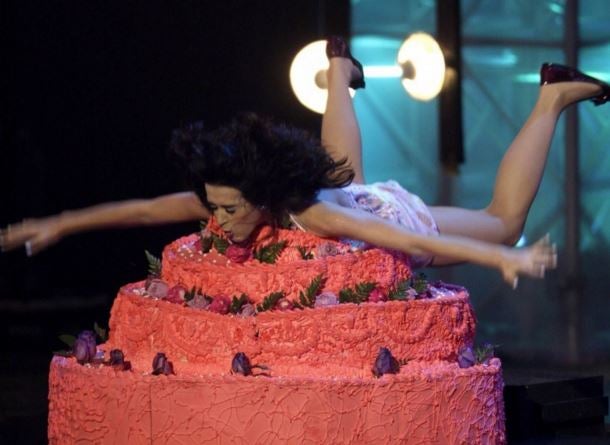Why embarrassment is a healthy emotion
The next time you have a cringeworthy moment, just try to laugh it off and remember that feeling bad just might be a sign that you're really good

Maybe you asked a woman when she was due, only to learn that she wasn’t pregnant. Perhaps you accidentally "replied all" with an inappropriate remark, or walked right into a sliding glass door at a busy restaurant.
We all have embarrassing moments. And in the age of the Internet, a lot of them are preserved for posterity — 50 Cent’s hilariously failed pitch at a Mets game, for example, or Katy Perry slipping over and over again in a pile of cake, and then having to crawl off stage. If you ever need to feel better about yourself, reddit’s “merry cringemas” thread features plenty of awkward kisses, stories about romantic confessions that were met with silence, terrible halting public speeches, and attempts to show off that went horribly wrong.
Try as you might to forget them, your most embarrassing moments likely float to the top of your mind at the oddest times, and cause you to cringe for years.
But, in this season of holiday parties and excessive egg nog, it might be good to note that research published a few years ago in the Journal of Personality and Social Psychology suggests that there is an upside to all those cringeworthy moments.
Though we think of embarrassment as a negative, unpleasant emotion, a blushing, stammering or flustered response signals to others that we care about social norms and are someone who can be trusted, the researchers say. The researchers also speculate that embarrassment could also be a sign of fidelity to a mate, since lot of people find interacting with people they are attracted to embarrassing.
Their study builds on earlier work by Erving Goffman, an influential sociologist. In the 1950s, Goffman argued that embarrassment was a way of signaling someone’s concern about social norms and a commitment to following them. Essentially, your embarrassment tells the world “this isn’t something I would normally do, and I won’t do it again if I have any choice in the matter." Goffman’s research suggested that embarrassment was a kind of display to help restore fluid social interaction when it had, for whatever reason, gone off the tracks, a nonverbal way of saying that you are sorry.
Researchers later theorized that embarrassment played a role in human evolution. When people get embarrassed, they often hang their heads, laugh nervously and avert their gaze – actions that resemble submissive behaviors in non-human animals, which help to avert harsh or aggressive reactions.
We usually don’t think of getting flustered or blushing as a sign of evolutionary fitness, but researchers speculated that it also has an evolutionary purpose in people. They postulated that, in humans, these kinds of responses might help signal that people were willing to develop long-term bonds with each other. In turn, those signals would help others distinguish between good people who were willing to cooperate and egotistical jerks who would just take advantage of others.
Embarrassment, like shame and guilt, is an emotion triggered by the feeling of violating a social code, and it’s a way of signaling that that code is important to us. One study has found that young boys prone to aggression, vandalism and disruptive behavior displayed less embarrassment when they made mistakes on an interactive test.
The research published in the Journal of Personality and Social Psychologist advances on that previous work. According to the authors, it provides the first data to show that people who are more easily embarrassed are more “prosocial” – defined as caring about others’ welfare and avoiding behaviors that might endanger it in some way.
The researchers carried out five different studies. In one, they had people tell stories about embarrassing moments, which include lots of anecdotes about tripping or farting in public. In another, they complemented a person effusively, and had them respond in either a proud or embarrassed way. They had subjects watch these exchanges, rate the person on a variety of characteristics, including their trustworthiness and generosity, and play games with those people that necessitated sharing resources with them. The experiments were designed to rule out other explanatory factors – for example, that people shared more with those who were embarrassed because they felt pity for them.
All of the tests indicated that people who displayed more embarrassment were viewed as more trustworthy and more generous. This chart shows how people share more resources with those who displayed feelings of embarrassment, compared with those who acted proud or neutral.
People alter their whole lives to avoid being embarrassed, understandably so – it’s an excruciating feeling. But the next time you have a cringeworthy moment, just try to laugh it off and remember that feeling bad just might be a sign that you're really good.
Washington Post
Subscribe to Independent Premium to bookmark this article
Want to bookmark your favourite articles and stories to read or reference later? Start your Independent Premium subscription today.

Join our commenting forum
Join thought-provoking conversations, follow other Independent readers and see their replies